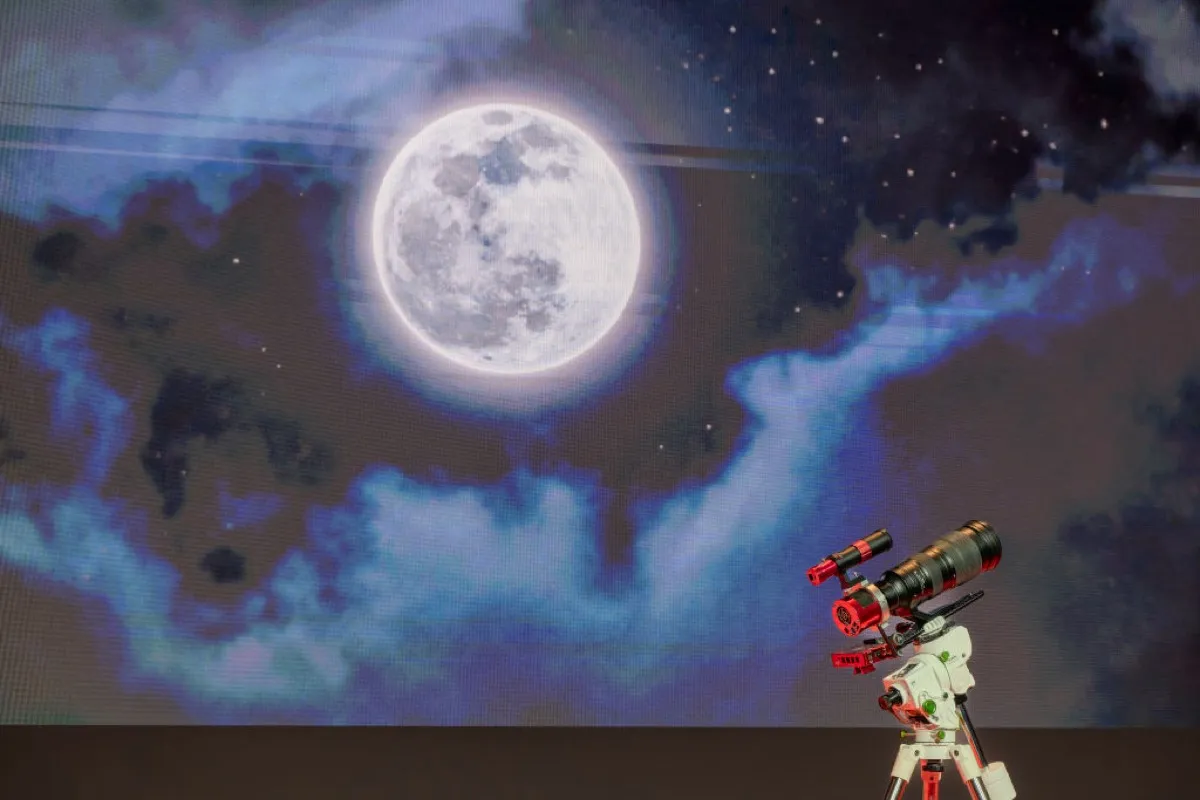“Space Lawyer” sounds a profession that’s too awesome to exist, but it’s not — you really can practice space law. To learn more about the subject, we spoke to two legal experts from the University of Nebraska College of Law Space, Cyber, and Telecommunications Law Program, as well as a legal news reporter for Massachusetts Lawyers Weekly.
When we first heard about the subject of space law via this BBC News screenshot, our brains naturally gravitated towards the absurd and surreal. You know, this sort of thing:
In actuality, space law is an incredibly complicated and fascinating realm of study that’s becoming more and more relevant as our technology continues to improve and we get farther out into the galaxy. And before you ask, no — there’s no space court or space jail. Yeah, we were a little disappointed, too. But it’s okay! Getting to ask a bunch of space lawyers about what action they would take against Grand Moff Tarkin more than makes up for that.
Here’s the panel we reached out to:
- Elsbeth Magilton, Executive Director of the Space, Cyber, and Telecommunications and U.S. Legal Studies Graduate Programs
- Professor Frans von der Dunk, Harvey & Susan Perlman and Alumni Professor of Space Law
- Julie McMahon, News Reporter for Massachusetts Lawyers Weekly and space law enthusiast
To keep things straight between each speaker, we’ve highlighted when each person is talking by bolding their first names.
At the end of the interview we asked everybody some very in-depth questions about Star Wars, Gravity, and Avatar, so if you’ve ever sat in a movie theater or on the couch wondering “Hey, how come nobody got in trouble for blowing that thing up?” then scroll down to the end for more on that. Or you could just read the whole thing, because space law is the coolest thing we’ve ever heard of and you really should learn all that you can about it so you can impress people at fancy dinner parties.
All righty, we’re done with introductions now. Space lawyers, engage!
–
When most people think of law, they usually divide it up into civil court vs. criminal court, because those are the only two things that get made into TV dramas. How would you define space law, then? Is it sort of like maritime law?
Elsbeth: In the legal world we tend to split law into two very different categories: litigation and non-litigation/contractual. Both civil and criminal court, and most TV dramas, fall into the litigation category. Truth be told, the life of most attorneys would be a painfully boring show to watch. Practicing law is mostly reading and writing, and then reading and writing some more.
Frans: The comparison with maritime law – in particular as regards the high seas – is very apt, as outer space like the high seas is a global commons, where no individual state can exercise its territorial sovereignty. One should note that we are speaking at the first level of (public) international law here, that is law as between various sovereign states part of the world community. At a second level, however, with the increasing measure of private and commercial involvement in space activities, we do also see national law addressing more specifically the concerns of such private entities, including contractual issues.
Julie: From my research, the closest sibling to space law is aviation law, and you can see how that makes a lot of sense. The majority of matters within space law, I would say, are civil matters, where you’re really seeing a lot of disputes between two non-governmental parties. Any practice area would be subject to these types of disputes. Space law is a lot of contracts. When you think about what it takes to get a vessel into outer space, it involves a lot of the same negotiations and lawyering that it takes to get an airplane into the atmosphere. Who’s going to man the spaceship? Where are the parts going to come from? Also, a lot of space law is related to satellites, so it involves the communications industry and and the body of laws governing it.
When someone violates space law, what type of court is it settled in? Do space law violations happen all that often?
Frans: Different from the U.S. (and most other states in the world) there is no extended court system which can automatically judge on any such violations (the International Court of Justice still depends on the consent of states involved for exercising jurisdiction) or an executive power (a “world police’) which can enforce sanctions. If the existing legal dispute settlement systems (think also about international arbitration) do not result in appropriate sanctions, it comes down to unilateral sanctions – the world community justifying armed sanctions against Iraq in the early 1990s as a consequence of its violation of Kuwait’s sovereignty – justified by the law. This of course gives rise to inequality; the big guys will always get away with much more since no one dares to take them on, and sometimes (see the second Iraq war) someone will abuse the system and seemingly-legal arguments to realize a political aim, rather than achieving international justice. While we have – luckily – so far not encountered any such situation in outer space, space law at heart is part of that same public international law system.
Julie: Space law is young, so what is and is not considered “space law” is, in my knowledge, yet to be determined. So there’s no real metric for determining how often space laws are violated. If I had to guess, the aerospace industry, and the people working on space-related projects, are a fairly compliant bunch. Spaceflight has been highly regulated, so they’ve had to be on their toes. But laws get broken, and those civil violations — breaking contracts, discrimination against employees, etc. — are facts of life on this earth. I’d guess that as the space industry is privatized — and it is moving in that direction with projects like SpaceX working on space tourism — there will be more space law violations, if you want to call them that.
Of course we want to call them “space crimes,” but “space law violations” works too. Anyway, moving on.
What does it take to be a space lawyer? Obviously you need a JD, but what else does the process entail?
Julie: You have to be a dork. Seriously, every self-proclaimed space lawyer who I’ve talked to flies their geek flag with pride. They’re insatiably curious people, and they’ve got the storm trooper action figures to prove it.
Technical proficiency is also a bonus. So if you understand how the laws of physics work, you might have an easier time understanding how the laws of space work. For every area of the law, that’s proving to be true. If you can talk the talk of your clients, you’re going to be a much more efficient advocate for them. Lawyers tell me that being a good lawyer stills comes first, though.
Elsbeth: I believe a passion for the industry is essential – but so is a very strong legal background. Nebraska graduates are so successful because they are very bright, professional, and have a love for the law as well as space. Beyond a successful JD program, attorneys need to specialize in space law. We’ve found many practitioners have accidentally fallen into space law while practicing in another area. Others specialize by attending a program like ours at The University of Nebraska.
Frans: Just to add to that: as space is increasingly ‘coming down to earth’, that is giving rise to more and more practical and hugely important, even crucial terrestrial applications, many other legal regimes than space law properly speaking become involved. Thus, knowledge of e.g. international trade law, IPR, tort liability or general telecom and cyber law are becoming important for space activities, too.
For the space lawyers: what made you, personally, interested in space law as your particular field of practice, and what is your favorite thing about it?
Elsbeth: My favorite thing about my position is definitely the people in this field. I love the opportunity to talk science fiction, tech, law, and life with professionals interested in the same things. You haven’t lived until you’ve participated in a Rebellion v Empire Star Wars debate with a faculty member and a student during a conference dinner. Yes, believe it or not, we have some people willing to argue for the Empire. In their defense, I suppose, the Death Star did employ a lot of people.
Frans: For me, it is the combination of a constantly evolving, exciting field with a very international, truly global scope and ever-increasing importance to the survival of the human species (and I am hardly exaggerating here, romantic or preposterous as it may sound).
Elsbeth: Also we – Frans more than myself – get to meet lots of astronauts, which is pretty cool!
What’s the best reaction anyone has ever had to finding out that you’re a space lawyer? Do you put in on your business cards? Because you totally should.
Frans: Most often, those not knowing of it first ask “OK then, so tell me, who owns the Moon?” and then burst out in laughter. Once however I start explaining (including the fact that ‘ownership’ of the moon, or more precisely natural resources thereon, IS a big issue), they rapidly understand that this is a serious, and actually quite important branch of the law. In any event, it always makes for nice conversation at a party!
[Ed: “Who owns the moon” must be the space law equivalent of somebody saying “Hey, it must be free!” when you scan an item at a cash register and it doesn’t show the price right away. Gag.]
Elsbeth: I have had at least three people accuse me of making up my title, saying, “space law can’t a serious thing, right?” I don’t call myself a space lawyer. While I graduated from law school I am (happily) not a practicing attorney, so I’ll stick with my Executive Director of Space, Cyber, and Telecommunications Law program title! Hey, ‘Executive Director of Space’ doesn’t sound half bad!
What would you say to any budding space law enthusiasts out there who might be reading this and are interested in exploring the field for themselves?
Elsbeth: A strong lawyer is a strong lawyer, no matter the field. Start with the fundamentals of international and domestic law, then let your passion for space take you to the next level.
Julie: As a general policy, I think that if you can call yourself an enthusiast about something, first of all, awesome. Second, you should be reading everything you can about the subject. And third, try writing about it, too, whether on a blog, on Twitter or elsewhere. Engage your passion.
If you’re thinking about going into law, I’d spend a lot of time learning what it means to be a lawyer and considering whether or not you are passionate about that. If you want to be space lawyer, that might mean doing some really fun stuff. But it also might mean spending $200,000 and three years in school. Or working 100 hours a week in a back office. A lot of people who go to law school don’t ever end up in a courtroom. So if you’re really, really passionate, the profession needs more people like you and this could be quite the adventure.
—
All right, here’s the part you’ve been waiting for — hypothetical pop culture-specific space law discussions. It’s about to get real up in here! Except for the part where it’s not actually real because these are all movies. But you get the idea.

Obviously in Star Wars, the Empire guilty of murder on a mass scale for the explosion of Alderaan. Setting that aside, however, are there any International-space related laws on the books that you would have used to prosecute them on the basis of property destruction? As the person who gives the destruction order, would Grand Moff Tarkin face any specific charges?
Frans: Ha! One should realize that the law we are talking about – as different from the laws of physics for example! – is made by humans for humans, so there is even a meta-legal question here whether that law applies to non-human species in the universe. There is actually a branch of space law dealing with such meta-legal issues, i.e. the Search for Extraterrestrial Intelligence (SETI) and the legal aspects thereof. Having said that, it may be assumed that (a) any intelligent life form in the universe would have a social construct very similar to ‘law’ as we know it, and (b) that something like ’murder’ would very likely be a fundamental ‘crime’ under such a construct as well. A bit like all civilized nations have crimes similar like that in their national legal systems, even if the parameters (think abortion, euthanasia) and sanctions (capital punishment or not?) may still considerably differ.
Julie: Because there isn’t a body of laws governing space, in theory, no, there isn’t grounds for prosecution. But certainly, under federal law, you can see how Grand Moff Tarkin might be found guilty of homicide, arson and a few other felonies. The problem is jurisdiction. The U.S. doesn’t claim jurisdiction over Alderaan!
Follow-up: who is responsible for cleaning up the debris of a blown-up or defunct space vessel? Does the Empire have to go and pick up all the pieces of the destroyed Death Star? Are they responsible for cleaning up after Alderaan as well, or does that fall on the remaining Alderaan survivors?
Frans: This all assumes of course that those non-human civilizations are subject to the human-made law, as per my previous point. Assuming for a moment that they are, unfortunately there is no clear-cut prohibition of creating space debris – YET. The international community is slowly coming around to develop and accept such rules; it may be at least another ten years or so before we are there, however. Currently, the existing law only says (a) if you plan on doing something of potential risk to other space activities and/or the earth, you should consult and inform other states and the UN, and (b) if someone actually is damaged by a piece of debris for which you are responsible, you would be held liable for such damage – presuming one can identify the original launching state(s) of the space object from which the space debris originally stems.
Elsbeth: If we do assume that space debris created by the exploration actually damaged someone’s property, like Frans theorized in (b) above, then we first turn to the relevant treaty (the 1967 Outer Space Treaty) and rules (the 1972 UNOOSA Liability Convention). Next we determine the liable state. As Frans explained, the launching state is liable for the damage they cause. The Rebellion, void of sovereignty, is not a state but a political organization governed under the Empire. The Empire carries the obligations under the treaty. Thus is seems, that the liability falls on the Empire – the problem being the Empire no longer exists. There is no nice tidy answer here.
As I responded I was chatting about my answer with my friend, and 2012 LL.M. Alum, Justin Blanset online. He added, “if the Second Republic is successor-in-state to the Empire, technically they might assume its treaty obligations, but that’s not at all clear.” He went on to add that this scenario is a good example of why his “research proposal on eliminating the concept of launching states is relevant – the Empire is liable for the Rebellion blowing up the Empire’s ship.” I think he makes a good point.

In Gravity, since Russia is responsible for striking the defunct satellite which becomes the dangerous space debris that makes the events of the movie possible, would they be held liable for any of the damages to Tiangong and Hubble? Would they have to pay any compensation to the astronauts’ families?
Frans: See my remarks above [about Alderaan, naturally], the basic answer being yes, with the caveat that they would need to pay such compensation to the U.S. (have not seen the movie, but assume Sandra Bullock and her colleagues act out U.S. astronauts) as the Liability Convention is an inter-state treaty; it is then up to the US to pay the astronaut families if appropriate.
![]()
We’re assuming the primary antagonists in Avatar are breaking some kind of law by messing up that big space tree on Pandora, but apparently the organization they work for, the Resources Development Administration, is considered a “non-government organization” — which makes them a private entity. Does that mean they skate by without penalty?
Julie: Being a private entity wouldn’t absolve a party from liability. If anything, the U.S. at least is steeped in the precedent of prosecuting private parties for violating the law. It would be entirely up to the discretion of the prosecutor, who would have to determine whether or not there was a case against the antagonists.
Elsbeth: It’s been years since I’ve watched this film, so my memory may be unclear on the circumstances. Was the Resources Development Administration working under a government contract? Did the destruction of the tree fall under the performance required by the contract? These answers could alter who is liable. Regardless, certainly a private entity can still be held liable for property damage. In fact, it may be easier to make such a claim against a private company, clear of government protections.
Frans: Assuming once again that man-made law applies, there’s two options: (a) sue the private operator in one court or the other, raising all sorts of jurisdictional and forum questions in an international environment such as outer space, or (b) address the state whose national the private operator is, as that state is internationally responsible under Article VI of the Outer Space Treaty also for space activities conducted by its nationals.
–
We’d like to thank Elsbeth Magilton, Professor Frans Von Der Dunk, and Julie McMahon for taking the time to answer all of our ridiculous space law questions — and an added shout out to Lauren Worley for getting us all in touch! To
learn more about space law, you can check out The International Institute of Space Law; the book Space Law: A Treatise by Francis Lyall and Paul B. Larsen; or the Space, Cyber, and Telecommunications Law website at University of Nebraska-Lincoln. Elsbeth also tweets from the account @spacecyberlaw, which you should totally be following if you’re a fan of space news in general.
- NASA is still investigating the remnants of Comet ISON
- As it turns out, space can have a pretty profound effect on you
- IceCube detects neutrinos, names them after Sesame Street characters







